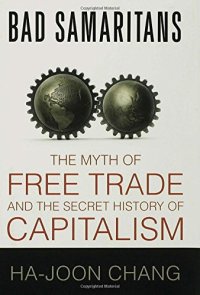
Ebook: Bad Samaritans: The Myth of Free Trade and the Secret History of Capitalism
Author: Ha-Joon Chang
- Tags: Economic History, Economics, Business & Money, International, Accounting, Economics, Exports & Imports, Foreign Exchange, Global Marketing, Islamic Banking & Finance, Business & Money, Globalization, Specific Topics, Politics & Government, Politics & Social Sciences
- Year: 2007
- Publisher: Bloomsbury Press
- Edition: 1st
- Language: English
- zip
A rising young star in the field of economics attacks the free-trade orthodoxy of The World Is Flat head-on―a crisp, contrarian history of global capitalism.
One economist has called Ha-Joon Chang "the most exciting thinker our profession has turned out in the past fifteen years." With Bad Samaritans, this provocative scholar bursts into the debate on globalization and economic justice. Using irreverent wit, an engagingly personal style, and a battery of examples, Chang blasts holes in the "World Is Flat" orthodoxy of Thomas Friedman and other liberal economists who argue that only unfettered capitalism and wide-open international trade can lift struggling nations out of poverty. On the contrary, Chang shows, today's economic superpowers―from the U.S. to Britain to his native Korea―all attained prosperity by shameless protectionism and government intervention in industry. We have conveniently forgotten this fact, telling ourselves a fairy tale about the magic of free trade and―via our proxies such as the World Bank, International Monetary Fund, and World Trade Organization―ramming policies that suit ourselves down the throat of the developing world.
Unlike typical economists who construct models of how the marketplace should work, Chang examines the past: what has actually happened. His pungently contrarian history demolishes one pillar after another of free-market mythology. We treat patents and copyrights as sacrosanct―but developed our own industries by studiously copying others' technologies. We insist that centrally planned economies stifle growth―but many developing countries had higher GDP growth before they were pressured into deregulating their economies. Both justice and common sense, Chang argues, demand that we reevaluate the policies we force on nations that are struggling to follow in our footsteps.
Book is a single html file, which is convenient for reading on any device. A mixture of economic theory, history and contemporary evidence is used to turn much of the conventional wisdom about economic development on its head. • Free trade reduces freedom of choice for poor countries. • Keeping foreign companies out may be good for them in the long run. • Investing in a company that is going to make a loss for 17 years may be an excellent proposition. • Some of the world’s best firms are owned and run by the state. • ‘Borrowing’ ideas from more productive foreigners is essential for economic development. • Low inflation and government prudence may be harmful for economic development. • Corruption exists because there is too much, not too little, market. • Free market and democracy are not natural partners. • Countries are poor not because their people are lazy; their people are ‘lazy’ because they are poor.
A mixture of economic theory, history and contemporary evidence is used to turn much of the conventional wisdom about economic development on its head. • Free trade reduces freedom of choice for poor countries. • Keeping foreign companies out may be good for them in the long run. • Investing in a company that is going to make a loss for 17 years may be an excellent proposition. • Some of the world’s best firms are owned and run by the state. • ‘Borrowing’ ideas from more productive foreigners is essential for economic development. • Low inflation and government prudence may be harmful for economic development. • Corruption exists because there is too much, not too little, market. • Free market and democracy are not natural partners. • Countries are poor not because their people are lazy; their people are ‘lazy’ because they are poor.